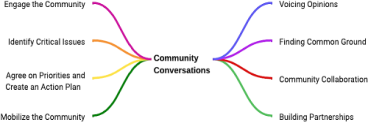Task 2.1
Conduct a socioeconomic status (SES) analysis to inform the development of equitable energy systems, and guide community outreach and workforce development needs in New Mexico’s diverse communities.
Researchers assigned to this task include Dr. Haggerty, Dr. Sullivan, Dr. Han, Dr. Zhao, and Dr. Shanahan.
This task involves a deep dive into the social and economic dimensions of the three targeted communities. Then utilize this analysis to prepare the research team and collaborators for effective community engagements and outreach, and help craft tailored energy solutions that inform strategies for addressing the unique challenges and needs of each community
Task 2.2
Utilize proven strategies for conducting community conversations to effectively engage the broader communities in identifying and co-developing equitable, relatable, and relevant strategies for energy systems management and to inform opportunities for future energy infrastructure investment and guide prioritization of vulnerable communities.
Researchers assigned are Dr. Sullivan, Dr. Surova, Dr. Han, Dr. Shanahan, Dr. Haggerty, Dr. Kirksey, and Dr. Shi.
This task focuses on fostering co-development and effective collaboration in energy planning through engaged community conversations. The task employs a stakeholder analysis approach to thoroughly understand the roles and influences of various stakeholders.

Task 2.3
Community-centric energy system design and implementation.
Researchers for this task are Dr. Han, Dr. Haggerty, Dr. Zhao, Dr. Wang, and Dr. Miller.
This task uses the insights from Tasks 1 and 2 to produce tangible energy solutions for communities like Kit Carson, Mora-San Miguel, and the Navajo Nation. By developing and deploying customized pilot energy systems that are attuned to the unique needs and expressed preferences of each community we will integrate successful elements from these community-specific energy systems into broader energy policies for the local communities and the states of the region.
Task 2.4
Developing context-sensitive energy justice measures for the digital twin.
Researchers include Dr. Han, Dr. Zhao, Dr. Haggerty, Dr. Zhang, and Dr. Surova.
By comprehensively studying the socioeconomic context of communities and recognizing the limitations of existing measures, which predominantly focus on the percentage of minority and low-income groups we are developing an integrated set of energy justice measures that will extend existing ones. By extending the existing ones, proposed by EPA and DOE, it will account for a broader spectrum of socioeconomic attributes.